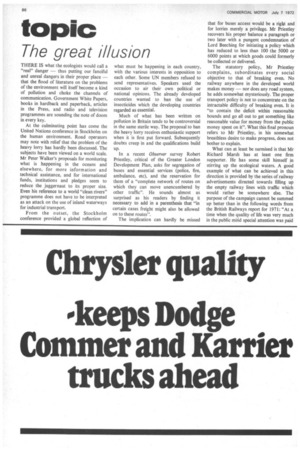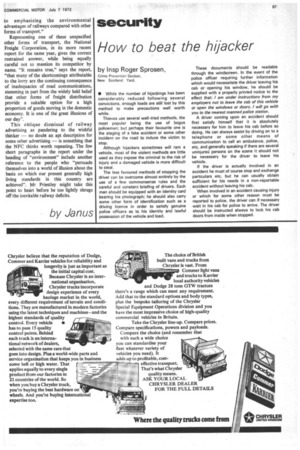THERE IS what the ecologists would call a "real" danger
Page 88

Page 89

If you've noticed an error in this article please click here to report it so we can fix it.
— thus putting our fanciful and unreal dangers in their proper place that the flood of literature on the problems of the environment will itself become a kind of pollution and choke the channels of communication. Government White Papers, books in hardback and paperback, articles in the Press, and radio and television programmes are sounding the note of doom in every key.
At the culminating point has come the United Nations conference in Stockholm on the human environment. Road operators may note with relief that the problem of the heavy lorry has hardly been discussed. The subjects have been viewed on a world scale. Mr Peter Walker's proposals for monitoring what is happening in the oceans and elsewhere, for more information and technical assistance, and for international funds, institutions and pledges seem to reduce the juggernaut to its proper size. Even his reference to a world "clean rivers" programme does not have to be interpreted as an attack on the use of inland waterways for industrial transport.
From the outset, the Stockholm conference provided a global reflection of what must be happening in each country, with the various interests in opposition to each other. Some UN members refused to send representatives. Speakers used the occasion to air their own political or national opinions. The already developed countries wanted to ban the use of insecticides which the developing countries regarded as essential.
Much of what has been written on pollution in Britain tends to be controversial in the same sterile way. The proposal to ban the heavy lorry receives enthusiastic support when it is first put forward. Subsequently doubts creep in and the qualifications build up.
In a recent Observer survey Robert Priestley, critical of the Greater London Development Plan, asks for segregation of buses and essential services (police, fire, ambulance, etc), and the reservation for them of a "complete network of routes on which they can move unencumbered by other traffic". He sounds almost as surprised as his readers by finding it necessary to add in a parenthesis that "in certain cases freight might also be allowed on to these routes".
The implication can hardly be missed that for buses access would be a right and for lorries merely a privilege. Mr Priestley recovers his proper balance a paragraph or two later with a pungent condemnation of Lord Beeching for initiating a policy which has reduced to less than 100 the 5000 or 6000 points at which goods could formerly be collected or delivered.
The statutory policy, Mr Priestley complains, subordinates every social objective to that of breaking even. No railway anywhere in the developed world makes money -nor does any road system, he adds somewhat mysteriously. The proper transport policy is not to concentrate on the intractable difficulty of breaking even. It is "to contain the deficit within reasonable bounds and go all out to get something like reasonable value for money from the public money spent on it". What this final pronoun refers to Mr Priestley, in his somewhat breathless desire to make progress, does not bother to explain.
What can at least be surmised is that Mr Richard Marsh has at least one firm supporter. He has some skill himself in stirring up the ecological waters. A good example of what can be achieved in this direction is provided by the series of railway advertisements directed towards filling up the empty railway lines with traffic which would rather be somewhere else. The purpose of the campaign cannot be summed up better than in the following words from the British Railways report for 1971: "At a time when the quality of life was very much in the public mitid special attention was paid to emphasizing the environmental advantages of railways compared with other forms of transport."
Representing one of these unspecified other forms of transport, the National Freight Corporation, in its more recent report for the same year, gives the correct restrained answer, while being equally careful not to mention its competitor by name. "It remains true," says the report, "that many of the shortcomings attributable to the lorry are the continuing consequence of inadequacies of road communications, stemming in part from the widely held belief that other forms of freight distribution provide a suitable option for a high proportion of goods moving in the domestic economy. It is one of the great illusions of our day".
This oblique dismissal of railway advertising as pandering to the wishful thinker — no doubt an apt description for some other advertising — is something that the NFC thinks worth repeating. The few short paragraphs in the report under the heading of "environment" include another reference to the people who "persuade themselves into a world of illusion about the basis on which our present generally high living standards in this country are achieved". Mr Priestley might take this point to heart before he too lightly shrugs off the inevitable railway deficits.
















































































































































